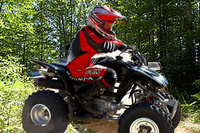All New All-Terrain Vehicles Sold in the U.S. Must Comply with Industry Safety Standards
WASHINGTON July 30, 2008; The Coalition for Safe and Responsible ATV Use – comprised of BRP, Honda, Kawasaki, Polaris, Suzuki and Yamaha – applauded Congress today for requiring all companies that import or sell ATVs in the U.S. to comply with the same vehicle safety standards and to implement the same training and other safety initiatives that established ATV manufacturers have followed for years.
The ATV provision creates a mandatory safety standard for ATVs. The provision was part of the Consumer Product Safety Improvement Act of 2008 (H.R. 4040) passed by the House of Representatives today. The Senate is expected to approve the bill later this week and President George Bush is expected to sign the legislation in August.
“These standards and programs are vital to ensure the safety of American ATV riders,” said Coalition spokesperson Ed Krenik. “We thank Senators Klobuchar, Pryor and Stevens and the other House and Senate conferees for their support in ensuring that this important ATV safety provision was included in the final Consumer Product Safety bill.”
Working with the CPSC and through the Specialty Vehicle Institute of America (SVIA), established ATV manufacturers developed a voluntary standard for ATVs, under the auspices of the American National Standards Institute (ANSI), and agreed to implement and follow “ATV Safety Action Plans” that were accepted by CPSC. The ANSI/SVIA standards and Action Plans address important safety issues, including appropriate configuration and performance aspects of ATVs, speed restrictions on youth ATVs, free hands-on training programs, and promotion of helmets and other proper gear. The established manufacturers also provide cash or product incentives for new ATV purchasers who complete the training course.
In recent years, non-traditional ATV companies, mostly from China, have entered the market in growing numbers. Many of these companies do not comply with the ANSI/SVIA standards and have refused to implement comprehensive safety Action Plans with the CPSC. Sales of these non-compliant ATVs are estimated to account for approximately one-third of the new sales market in the U.S. Moreover, these companies are marketing many of these products directly to those most vulnerable to safety risks, those aged 16 and younger.
“Many non-traditional ATVs do not adhere to even minimal safety requirements, nor do the companies provide training or safety information,” said Krenik. “The poor quality of many of these ATVs create a danger for all ATV riders, particularly young riders, who are being targeted by these companies.”
The ATV provision codifies the current voluntary standards and Action Plans. In effect, the bill creates immediate mandatory standards for all ATVs sold in the U.S., both imported and domestic.
“The big winners in this legislation are American consumers, who can be assured that any new ATV they buy in the U.S. will adhere to the safety standards and training programs developed over the past 20 years,” said Krenik.



